Wednesday, 02 October 2024
What about a stroll to the banks of the Werra river, a chat with a glass in your hand, a coffee break with gorgeous cake, ice-cream or a savoury snack?
Chez Nadine is a relaxed camp consisting of two wooden site waggons serving as kitchen and coffee/bar and two large awnings providing shadow and rain protection for beer benches and tables. A popular and relaxed meeting spot where it's easy to mix with locals while having organic food and drinks – try the local organic beer with a perfectly thin Flammkuchen (the Alsatian alternative to pizza) available both, as vegetarian, vegan and omnivore versions.
However, the beautiful open-air cafe is in danger: The federal state of Hesse has been planning a new
massive concrete bridge for goods trailers here, and although this bridge will destroy the waterside lawn and increase noise and exhaust pollution for the citizens living in this touristic town local authorities do not object as alternative, sustainable traffic solutions would have to be paid for by the municipality itself. Local climate and environmental organisations are lobbying for the re-activation of a former train line for the goods transport. Let's hope for the best.
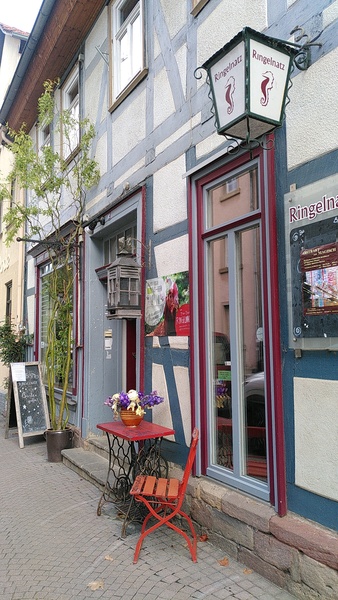
Not only on bad weather days or during the cold season there's a welcoming alternative, the art cafe
Bistro Ringelnatz in the inner city, which also sports outdoor seating in a garden in the backyard. All food and drinks are organic, often with biodynamic ingredients grown in the vicinity. During the semester break in summer opening hours are quite restricted, but my guess is that the place is going to open on evenings when the students of the Department of Ecological Agricultural Sciences are back in town, together with concerts readings and exhibitions. The department is the reason for a high density of organic farms and market gardens in the region which provide produce for the Ringelnatz kitchen. This is also the reason why the changing hearty vegetable soups come at an unbeatable low price: Already the small serving is sufficient provided you do not come very hungry.
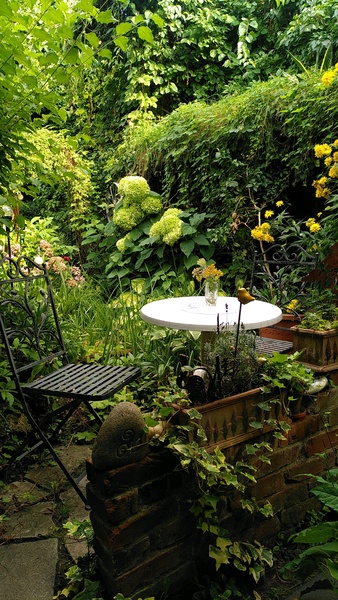
The cafe's name is taken after German painter-author Joachim Ringelnatz famous for his intelligent satirical nonsense poetry, and it is said that the patron is occationally reciting poems for his guests. If he isn't you may get a poem from the poetry generator in the corner (provided you have a 50 cents coin at hand).
For an organic soft or coffee drink you may also visit
Haases Garten-Café, a beautiful garden cafe in the backyard of the Haase household equipment and cocooning shop.
The cafe is open when you find a stand-up display on the walkway in front. To enter the cafe you have to pass through the shop. Unfortunately the home-made cake isn't necessarily made from organic ingredients.
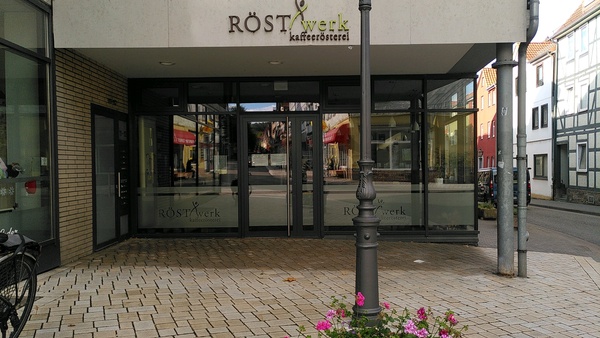
If you are lucky enough to arrive during the opening hours of the
Röstwerk coffee roasters' use the chance to have a freshly roasted organic coffee. As I had no such luck I wasn't able to ask about the non-certified coffee and the milk.
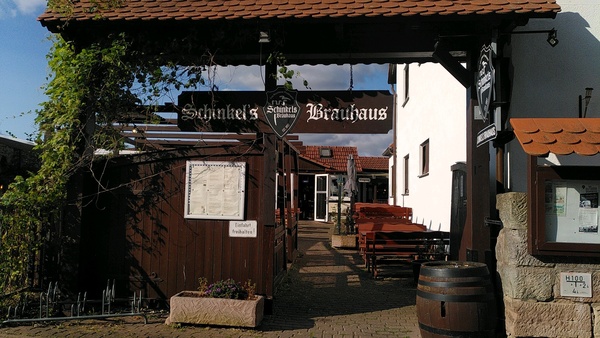
With its strong focus on regional and organic produce
Schinkels Brauhaus, the beergarden of the local organically certified brewery, is the perfect place for beer, meat and burger lovers with a conscience. Organic poultry from Frischgeflügel Roth, beef from the Gut Fahrenbach's cattle fed on Schinkels' draff, cheese, milk (used in the ice-cream of the Griesel dairy farm), and nonetheless the beer made with local organic barley are all produced within a 50 kilometres radius.
Unfortunately the vegetarian dishes (with a notable exception of the
asparges from the Klenke farm in Bad Sooden-Allendorf during the season) do not have organic main components. As most breweries nowadays they also make lemonades dubbed "WIZ" which are organically certified.
There's indoor seating, too, important during the cold season.
More to try
At a significant distance from the town the village of Berlepsch-Ellerode also belongs to Witzenhausen. Here you'll find the
Cafe Hofgarten Gut Hübenthal, an
organic farm cafe and probably also shop as the farm is the homebase of the
organic delivery service Grüner Bote.
2024-10-02 16:00:00
[Witzenhausen, Werratalradweg, organic, coffee, lunch, cafe, restaurants, beergarden, burgers]
[direct link · table of contents]

Tuesday, 24 September 2024

Cities with major universities have had organic shops long before the arrival of the big organic supermarkets, and Göttingen doesn't make an exception:
Probably the eldest still existing organic cafe in town is
Café Inti,
serving soups, salads and bowls. Needless to say that they offer Italian-style fairly traded coffee drinks (with organic milk from a local farm if you like) and yummy cakes, and what's even better: They serve breakfast until 2pm, and the waitress proudly ensured me that everything was organic. A welcoming place all day around if you like places with a liberal collegiate atmosphere whereof there are quite a number in the city.
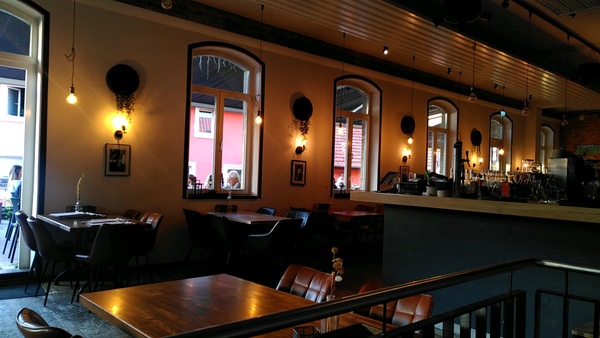
At the market place Am Wochenmarkt climb the stairs up to lokal neun, a dinner restaurant using preferably organic ingredients from the region.
It serves organic burgers and steaks, but also vegan dishes. A pleasant place to enjoy a summer evening on the roof terrace, but unfortunately the cocktails aren't organic. Note that the kitchen already closes at 9pm.
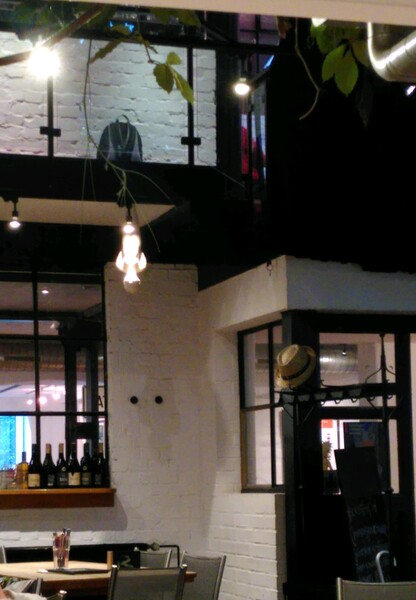
Theatre, comedy, concerts – the
Apex near Deutsches Theater stages an interesting blend of cultural entertainment, predominantly in German. From the street the place run by a non-profit association is barely visible if you aren't aware of the address, and I was surprised to find such a spacious rustic restaurant (instead of the small theatre bar I had imagined) after passing the hallway.
The place is neither fully organic nor certified, but many ingredients come from organic farms and producers in the region. Where else would you expect to find a comforting home-made chicken soup (made from organic chicken)? On the menu of the week I was there, I also found wild boar or the yummy shashuka with organic eggs and tomatoes (which I had). In addition to the weekly changing seasonal menu there's a bunch of rustic German or Mediterranean starters and main dishes served regularly, some of them suitable for vegans. The tasty home-made white bread made from organic wheat tasted home-made rather than made by a professional artisanal baker. There's a selection of organic drinks, unfortunately none of the wines. The service (many of them seemed like students) was swift and attentive, and the guests mainly local, of a broad range of ages, my guess would be between 30 and 70.
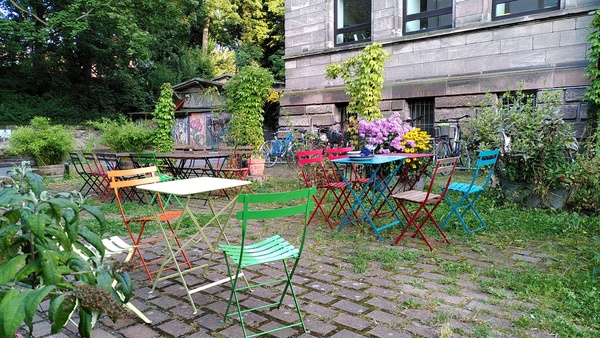
Film enthusiasts will love the Méliès arthouse cinema inside a former Baptist church on Bürgerstraße. But whether you want to have a snack prior to the film or a simple mediterranean dinner the
Bistro Cichon im Méliès is the perfect place if you like cafe bars decorated by film lovers. During the warm season you can sit in the beautiful garden – when it's raining there's also a small greenhouse to keep you dry, You will be served but you better place your order inside. There are two entraces to the bistro: one through the cinema from Bürgerstraße or a flight of stairs at the rear of the house when you come from Gartenstraße via a parking lot. The stairs at the rear facing the garden lead to the kitchen.
While the (vegetarian) food, sweets and non-alcoholic beverages are predominantly organic the selection of organic wines is surprisingly small. The focus is on snacks from the Mediterranean, tasty but not necessarily authentically spiced. If you go for the soup of the day you will be served a filling and comforting serving at a more than fair price. Unfortunately the place – just as the "lokal neun" – does neither serve food nor coffee on Sundays and Mondays. However, also on these two days in keeps open to sell prepackaged organic sweet and savoury snacks and cold drinks before the film screenings.
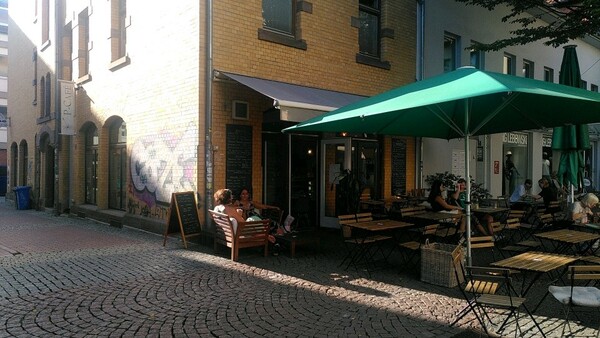
Another vegetarian, vegan-friendly place is the P-Café in the backyard of St. Nikolai church. Here they are highly
attentive to allergies, lactose intolerance and gluten-free diets, and wheelchair users are kindly asked to ring the bell at the main entrance facing the narrow lane part of the Nikolaikirchhof. And the best of all: it's 100 percent organic – warm and cold drinks as well as the cakes, breakfast items, salads, soups, sandwiches and wraps. The pleasantly decorated place hosts game nights (Göttingen has quite a tradition for playing board and card games in good old analogue fashion) as well as small concerts and musical sessions, readings and other cultural events. During the warm season you can sit outside, enjoying the church yard. And the best: The place keeps open on Sundays.
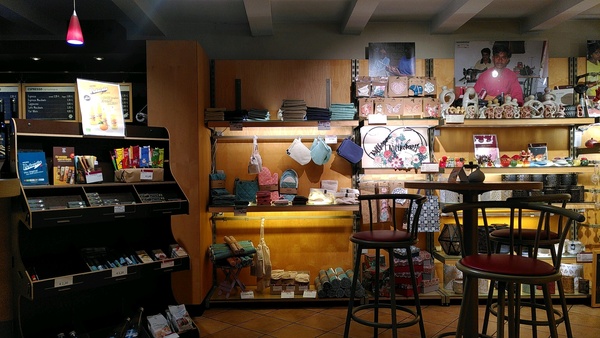
Coffee places
If all you want is a coffee shot head for the city's only organic coffee roasters',
Contigo. This fair-trade shop not only sells colourful gifts, fashion items, jewelry, organic coffee and chocolates, but sports a beautiful cafe corner serving organic coffee drinks and refreshments. If you choose a capuccino, flat white, latte or espresso macchiato with cow or oat milk, the milk comes in returnable cans from the Naturmilchhof dairy farm about half an hour by bike away.
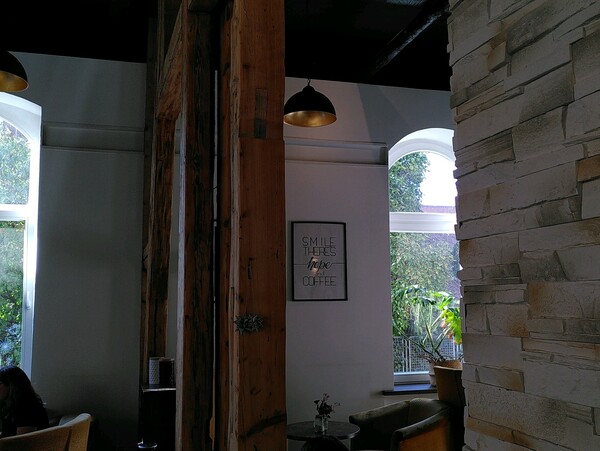
The farm also supplies milk to the Christian charity cafe
Hope or Cafe Hoffnung next to St. Mary's church (Sankt Marien). You can also have organic fruit and soft drinks, but the cakes do not contain organic ingredients. Be aware of that there's an evangelical denomination behind this place.
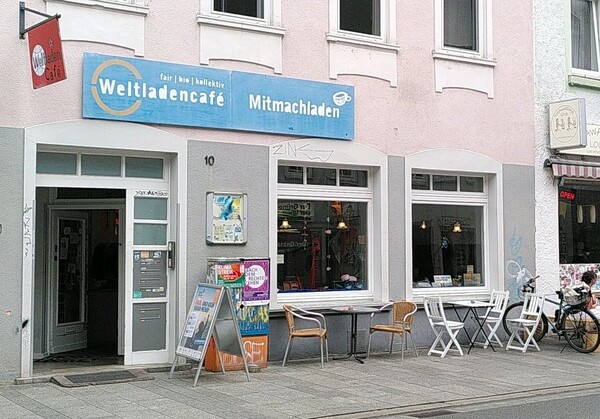
Personally I prefer the
Weltladencafé fair-trade shop cum café near St. Nikolai church: a little shabby and focused on being a social meeting place it doesn't offer as
much handicraft as other fair-trade shops. Even without an own roastery it's more café than shop, a homely-bohemian living room with outdoor seating on the footpath when the weather is nice. The place is run by a collective of volunteers, so be nice even when the service isn't swift: They aren't paid to serve you.
Come by for a recreational coffee break with coffee from a steam-driven espresso machine. You may choose between milk, soy or oat drink, all organic. Occasionally home-made vegan cakes are being served: Since they are home-made by volunteers I wouldn't expect that they are always made from predominanly organic ingredients. Unfortunately they don't serve savoury snacks, but you may of course buy some fairly traded nuts or chips and consume them at the café.
Missing a traditional Italian coffee? At the
Preferita ice-cream parlour the coffee tastes authentic, even though the place isn't run by Italians. Ordering a caffè affogato (espresso with cream ice-cream) doesn't require an explanation. The owners plan to extend the place to a pizzeria, but were still looking for a pizzaiolo in September, 2024.
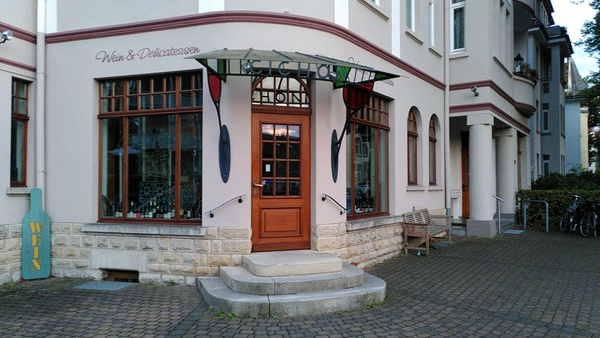
Tourists do not necessarily frequent the Südstadt of Göttingen, but if your bus stops at Lotzestraße you may decide to leave it for a coffee at the
Cichon Wein & Delikatessen delicatessen and wineshop. Not everything here is organic, but the owners take pride in carefully selecting artisanal wines, cured meat, cheese, oil, vinegar, preserves and more. You may also by buy organic sweets and chocolates. It's the same people who run the Bistro at the Mèliès cinema.
At the main train stations of bigger German cities
you will usually find a franchise serving coffee drinks made with organic milk, either a "Coffee Fellows" shop or, as in Göttingen, a branch of the organic porridge brand
"Haferkater". If you have sufficient time insist on having your coffee in an earthenware cup on the spot; returnable cups for a coffee on the go unfortunately require registration with an app. The shop's comparably liberal opening hours make it a good last resort for a healthy sandwich on Sundays, early mornings or weekdays after 6pm. However, if you have sufficient time on a weekday, you may rather opt for a without doubt 100 percent organic sandwich from either, the Bioladen in der Burgstraße or Alnatura.
Closed
2024-09-24 12:00:00
[Goettingen, organic, fair, coffee, tea, breakfast, lunch, dinner, cafe, restaurant, gifts, cinema]
[direct link · table of contents]

Monday, 23 September 2024
Both touristically attractive historic towns have direct hourly local train connections with each other and to Göttingen. You can also
continue your bike tour along the
Werratal bike route from Eschwege via the spa town of Bad Sooden-Allendorf to Hannoversch Münden (partially on the iron curtain corridor), and from there on to Göttingen.
Eschwege
Although Eschwege provides medical and cultural facilities for many smaller (and in the past often more important) small towns around and moreover is one of the few (West-)German towns where people transport by railway was discontinued in the 1980-ies and re-opened (with a new railway station) by the end of 2009, I couldn't find any cafe, restaurant or eatery serving at least a few organic items.
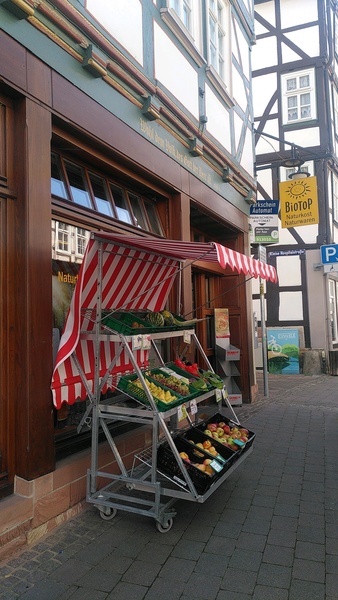
Even the organic convenience store
Biotop
on the premises of the former mutual savings bank ("Sparkasse")
does not have a cafe corner. But you can order a roll with cheese of your choice to take with you from their bakery and cheese bar. The friendly and well-assorted shop with its archetypal wooden interior offers all you need of organic food and household necessities, and, as delivery service "The rolling organic shop" ("Der rollende Bioladen") also serves the neighbouring municipality of Bad Sooden-Allendorf.
If you cannot find all you want here, the town's
Reformhaus (health food shop) and the Tegut supermarket offer a good selection of organic products alongside with their conventional fare.
For organic eggs you may also take a bike tour to the "Regiomat" vending machine of the nearby organic
Werragut farm. There you can also order and collect bread and rolls from the farm's bakery; their
hens are butchered and sold by Frischgeflügel Roth in Witzenhausen.
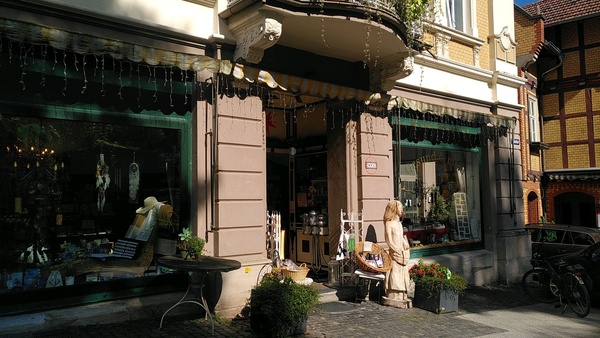
Bad Sooden
The medieval spa twin-town with its beautiful half-timbered houses does no longer have an organic corner store, but it sports a Sunday-open shop selling herbal teas, organic skincare, natural perfumes and incense, books on wellbeing, a selection of fairly traded sweets and more:
Eden – gesund & mehr in Sooden.
For organic food on the Sooden side of the Werra river (including unpackaged organic bread and rolls) head to the (conventional) Tegut supermarket in the Sooden industrial area (more or less a lifeless parking lot). A branch of the drugstore chain DM a five minutes walk from the train station is offering a huge range of pre-packaged organic dry food and preserves as well as certified natural bodycare.
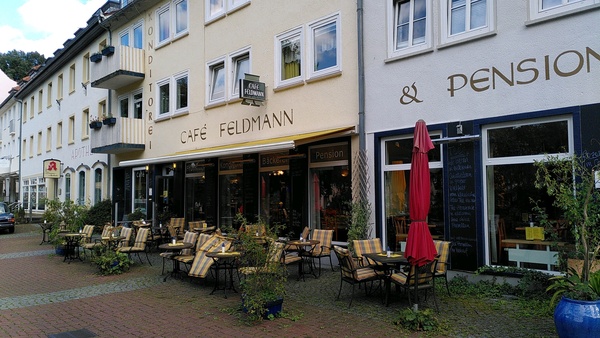
Spa guests and patients of the various rehab clinics in the medieval salter town are the main target audience of
Café Feldmann, the spa town's grand cafe and confectioners' shop by the spa gardens (Kurpark).
The cafe used to be a customer of the no longer existing organic Bäckerei Schill, but the breakfast rolls you get when staying overnight in the attached bike-friendly bed & breakfast place or have breakfast at the cafe are no longer organic in 2024. The milk used for coffee drinks and tea are organic, and eggs served for breakfast or lunch, too. The waitress had to find out herself when I inquired, so there's still a chance that more organic ingredients are (occasionally) being used in the kitchen, but I can't tell.
Allendorf
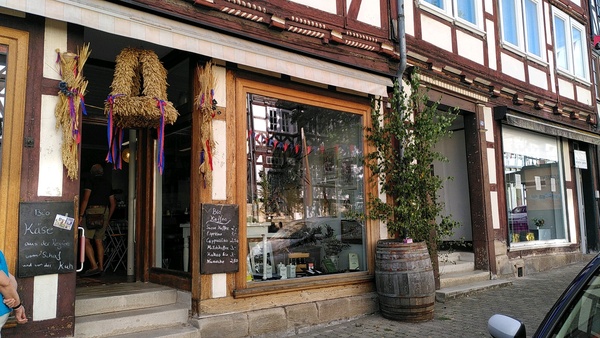
On the other side of the train line and the Werra river, in the older town of Allendorf (in the medievals Sooden was the "industrial area" while everyone, from the salters to the owners of the salt pans lived in Allendorf) you'll find a fully organic wine shop cum cafe, the
Laden 41. In addition to the
wine, you'll find honey, greek olive oil and preserves, local cheese, and bread and rolls from the Werragut farm. The latter you have to order upfront, but since the shop keeper always orders a little more you may buy a bread spontaneously.
Unfortunately it's open only three half days of the week. Whether you are interested in having an organic coffee, beer, lemonade or a glass of wine, or are in the mood for a chat with locals, mark them in your calendar.

Thursday in general is the weekday when many smaller shops in the region open for the first time, and so does
Café Clown, a cosy small cafe directly located at the Werratal bicycle route, with a beautiful view at a branch of the Werra river with the picturesque "Tiny Venice" ("Klein-Venedig") neighbourhood (in the past the houses of the local fishermen). Here you can have comforting home-made cake (including the filling Westphalian Pickert, a sweet potato cake), coffee, and frozen yoghurt
often made from regional, sometimes organic ingredients. Tea, milk and eple juice are generally organic, and if not asked specify that you want the organic variety of sugar beet syrup on your Pickert.
The cafe's name derives from the owner's charity work as a clowndoctor. Her partner is an architect and urban planner who has been planning and conducting social house and neighbourhood building projects with natural materials for decades. The two also offer accommodation in their adjacent tiny house, carefully restored with natural materials and equipped with a rain shower. Ring them for booking even though you find the place on AirBnB.
How can a bookstore survive in a once important medieval smalltown? The
Buchhandlung Frühauf in Allendorf has found a way by offering more than books and stationery: The bookseller added regional products to his assortment, both, books with a regional context, and a shelf with drinks and preserves from the region (some of them organic) and a few organic wines to go with your book. Until autumn 2023 they also sold organic bread and rolls by the organic bakery Bäckerei Schill until the baker retired without finding a successor to take over the workshop.
Oberrieden
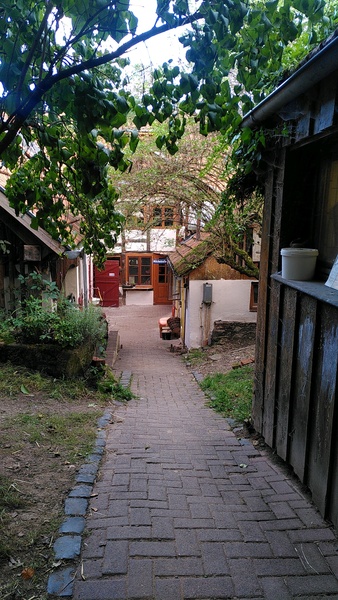
However, there's still an organic bread bakery in Bad Sooden-Allenberg: The organically certified community-supported agricultural (CSA) collective
Höhberg-Kollektiv in the village of Oberrieden (which is a part of the municipality) runs both, a dairy and a bakery in addition to a market garden and a school farm. First of all they distribute their products to their subscribers, but from Monday afternoon to Wednesday evening you can buy excess produce by leaving cash in an honesty box. How frequent you can find bread or dairy products there I cannot say.
Dietzenrode
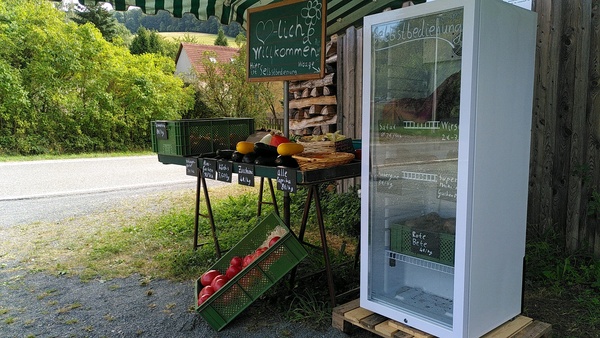
The vicinity to the Witzenhausen department of Ecological Agricultural Sciences certainly plays a role in the comparably high density of CSAs and organic market gardens in the region. Just across the border between Hesse and Thuringia, the
Gemüseinsel ("vegetable island") in Dietzenrode is the one closest to Allendorf, about half an hour by bicycle. This CSA market garden has a booth cum fridge where you can buy freshly harvested vegetables 24x7 without being a member. You pay by putting your money in an honesty box, so come with sufficient cash.
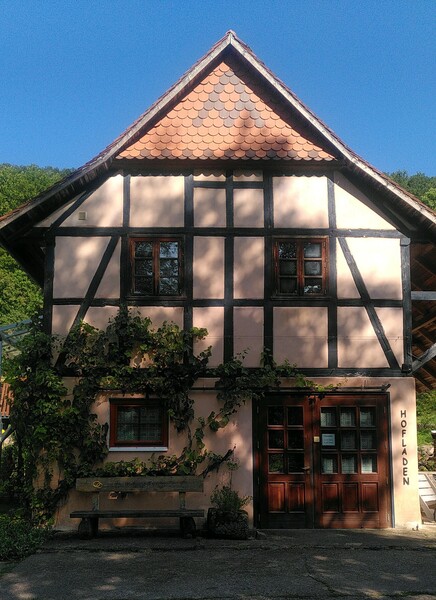
The Gemüseinsel is located on grounds formerly used by the
Inselhof, a more than 30 years old organic farm, established by Witzenhausen graduates after the reunification of Germany.
The farmers couple is gradually about to retire: They gave up mixed farming recently, but are continuing with a vegetable garden and fruit
orchards. The latter provide ingredients for the farm's distillery. You can order their special small-scale spirits on-line or buy them from the farm shop which in summer 2024 still offered frozen and preserved meat and sausages from the last flock of animals, vegetables from the garden and apple juice from the orchard, cheeses from farmer friends and a small selection of organic bodycare.
Their products are all organic, but no longer certified.
Closed or no longer organic
When the artisanal baker Schill closed his workshop in October 2023 the region lost its only organic baker. He also delivered to Café Himmelspforte, the parish café of Allendorf's Lutherian St. Crucis church, with its beautiful outdoor seating next to the "bible garden" with a display of plants mentioned in the bible. Nowadays the only organic item the café offers is one type of organic tea bags.
2024-09-23 13:00:01
[Eschwege, Bad_Sooden, Allendorf, Dietzenrode, Werratalradweg, organic, coffee, lunch, cafe, supermarkets, grocery, accommodation, sunday_open, Regiomat]
[direct link · table of contents]

Wednesday, 18 September 2024
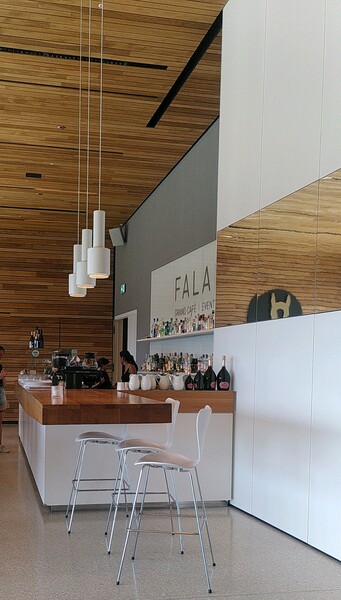
If you are on the outlook for a cafe serving at least a limited selection of organic drinks and have no idea where to go, modern and art museums usually are a good bet. This algorithm also works in Kassel: The cafe cum restaurant of the Grimmwelt, a museum dedicated to the lifes, works and influence of the Brothers Grimm, dubbed
Falada (like the horse in the fairytaleThe Goose Girl) serves coffee drinks with
organic milk, organic burger from the local Biometzgerei Armbröster, and organic eggs. Their
home-made cakes are also made with organic eggs and milk. You can have
an organic white or red wine, tea, organic gin (by The Duke) and fruit juices with sparkling water ("Schorle"). The place is
organically certified;
breakfast is being served until noon.
Come hungry if you want to have a burger as a big helping of fries is included. The fries actually are chips (half-slices of potatoes) and very nice. The chicken burger was made with organic chicken, but unfortunately the juicy meat had a dry and hard (instead of light and crispy) cornflakes coating.
During the warm season and when the weather is nice the museum sports a beautiful beergarden,
Grimms Garten, run by the same caterer. Unfortunately the 2024 season is already over.
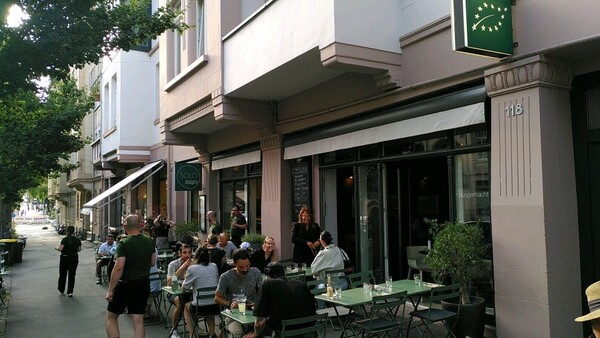
If you want to eat outdoors on nice weather days in autumn, the fully organic pizzeria
Solo has garden tables on the footpath in front of it. Traditional Italian pizze or carefully selected modern topping combinations like salmon, zucchini and pine nuts on extremely nice (that is: both, soft and crispy) pizza bases make up for about half of the menu, and the pizza arrive in minutes after I placed my order. The other half of the menu consists of Italian
starters (soups, salads or antipasti) and pasta. The menu also offers one traditional Italian second course, served in the German tradition with fixed add-ons.
Even if you aren't hungry simply step by for a relaxed coffee or aperitivo.
On the other side of the street you'll find the city's organic butcher
Armbröster. I haven't been there during the shop's opening hours, but I suspect that you can get a sandwich or even lunch there: Most artisanal butchers server sausages or grilled meat with bread or potato salads. Whether you'll find something suitable for vegetarians or vegans, I however don't know.
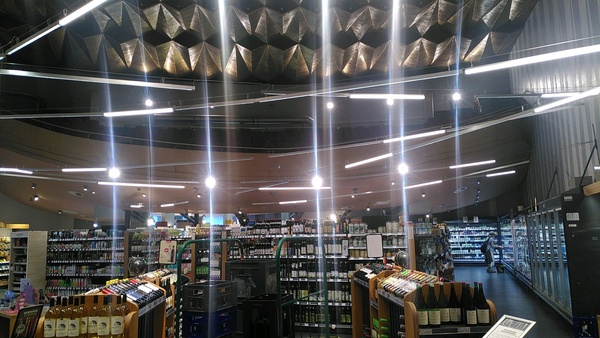
Most organic supermarkets of the
Denns Biomarkt chain offer freshly made sandwiches and coffee drinks from their bakery tills in the entrance area. But the Biomarkt at Königsplatz is something special: The supermarket is located on the premises of the former Kaskade-Filmpalast cinema, a protected historial monument from the 1950ies, famous for its illuminated fountains in front of the screen. The cinema was revived for a short time during the documenta (13) contemporary art exhibition in 2021. Now you can have a view at both, the cinema's gallery, and the fountain pipes protected by a glass floor, in the rear of the supermarket. You may also take your coffee, sandwich and (in the summer) pre-packaged Cortina ice-cream upstairs to a cafe area with a view at the cinema's chairs and ceiling. The stairs are located opposite the bakery till, to the right from the entrance.
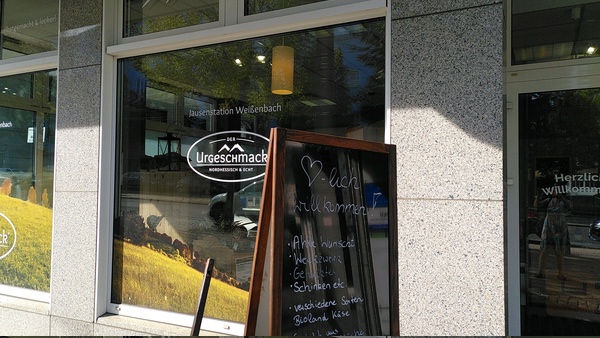
Travellers arriving at or leaving from the long-distance train station Kassel-Wilhelmshöhe will find a small farmshop cum delicatessen only a few steps from the station: The
Urgeschmack-Hofladen Jausenstation
offers organic cheeses and other dairy products, but first of all cured meat and sausages from a farm run according to the principles of organic agriculture but not certified organic. Unfortunately the shop was closed when I found it, but it seems to provide you with picnic food and travel provisions as long as you are an omnivore.
More to try
When I tried to get myself a coffee from the Danish cafe
Frokost hos Line (Norwegian/Danish for "breakfast at Line's") I found the place busy but closed for the general public. So I cannot say how much organic ingredients they use in their Danish sandwiches ("smørrebrød") and cakes. They used to have organic coffee and milk, and I hope that Line is going to continue with a strong organic focus after re-opening.
In the course of my upfront research I found the following place
which I did not had time to visit. Let me know if you can confirm or deny its existance.
2024-09-18 16:30:00
[Kassel, organic, coffee, tea, breakfast, lunch, dinner, cafe, restaurant, pizza, butcher, eatery]
[direct link · table of contents]

Monday, 09 September 2024
Kassel is a city consisting of many straight and very long avenues. One of them, the Wilhelmshöher Allee, connects the inner city with the train station Kassel-Wilhelmshöhe serving long distance connections, and Europe's largest hillsite park and UNESCO World Heritage site Bergpark Wilhelmshöhe with its impressive baroque monuments. Your way there is sweetened by two organic ice-cream parlours.
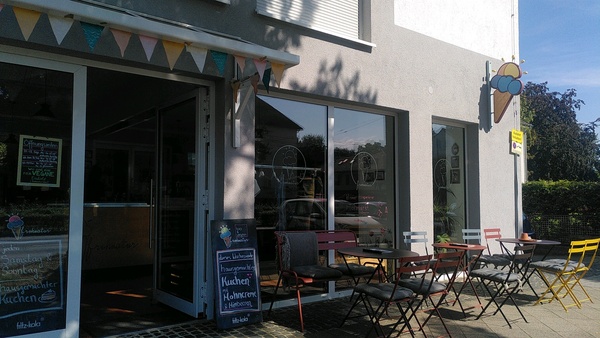
Vegans should stop at
Frohnatur, a young and dedicated vegan organically certified ice-cream parlour. The flavours are made from a variety of plant-based drinks, supporting the name-giving flavouring ingredient. My favourite is pumpkin seed while less fatty, more subtle flavours such as tonka are missing a round and creamy note.
All ice-cream flavours are served made into "spaghetti" or in classic German ball shape, according to your liking, and there's a sundae menu (among others sporting a popcorn sundae). You can get a proper Italian coffee drink and have waffles or a home-made cake. The wafer cones are also
home-made, and small pieces are being served with your espresso.
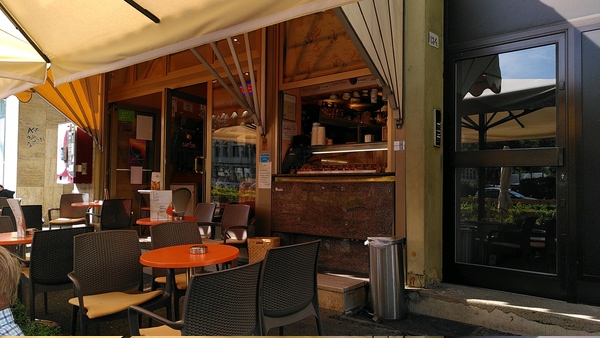
If you like the classical West-German Italian ice-cream parlour with its greasy sundae menu and the brownish-red plastic-coated cushion seats (to name only a few prejudices) a visit to
Eiscafé Cortina is a must. You probably wouldn't expect such a place to be 100 percent organic, but here you are, and if you have a fancy for less common flavours in an ice-cream cone on the go it takes a while to make a decision. Traditionalists, rest assured: you'll also find standard flavours, and most organic supermarkets in town and in the vicinity stock pre-packaged Cortina ice-cream in standard flavours. Needless to say that this ice-cream parlour is also a gorgeous place for the classical Italian coffee espresso shot.
2024-09-09 21:30:00
[Kassel, organic, ice-cream, vegan, coffee, cafe]
[direct link · table of contents]




























